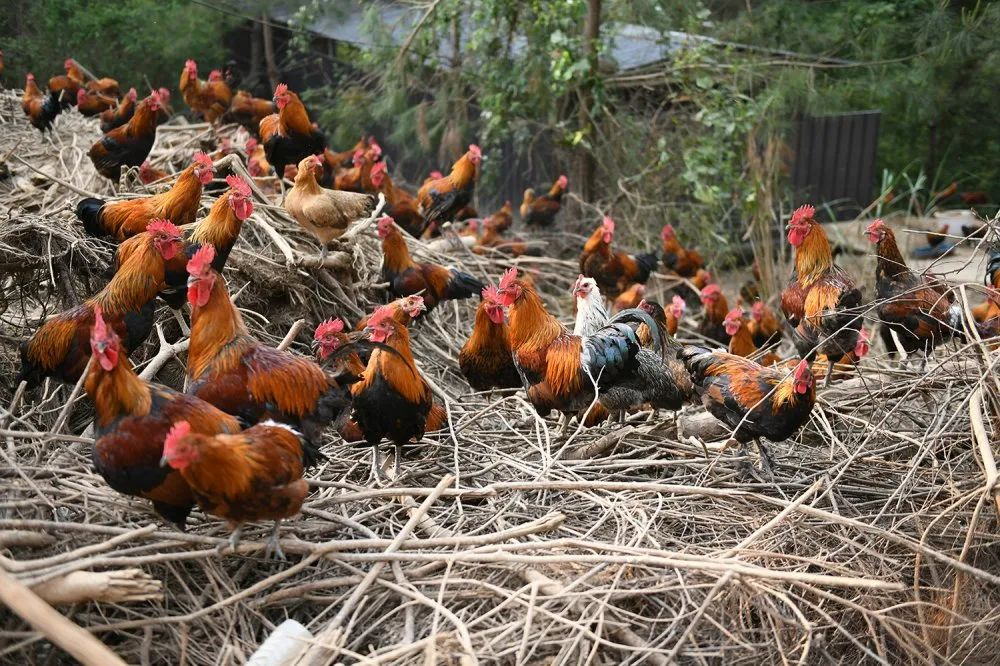Liver is the largest detoxification organ of the organism, harmful wastes and foreign toxins produced in the metabolic process of the organism are decomposed and oxidised in the liver.
High-temperature season chickens with drugs is inevitable, and all the drugs that enter the chicken body have to be degraded through the liver, at the same time, the probability of chickens infected with mycotoxins, Escherichia coli, salmonella and so on during the high-temperature period increases, which also increases the burden of the liver.
Fatty liver is a problem that chickens are prone to in summer:
In the high temperature season, some farmers are worried about the low feed intake of chickens, not enough energy, so they add soybean oil to the chickens, excessive soybean oil so that the energy and fat content in the feed is too high, resulting in the liver can not be adequately converted, decomposition, fat stagnation in the liver resulting in fatty liver. This is when the chickens are easily caused to die of liver rupture when they are frightened or heat stressed.
Changes in autopsy of laying hens after death from heat stress:
Dead chickens subcutaneous fat haemorrhage occurs, the liver is earthy yellow, obviously enlarged, the texture becomes brittle, there are often bleeding points or blood bubbles under the liver peritoneum, sometimes the liver will be ruptured and bleeding, at this time can be seen on the surface of the liver and even the entire abdominal cavity there is blood or blood clot, the disease lasts for a long time, the liver is obviously deformed, atrophy, the surface of the surface is often there is a white fibrous protein oozing material.
The following measures can be taken for the above reasons:
1, the high temperature season should reduce the chicken feeding density, ensure sufficient water, adjust the feeding time, choose to feed in the morning and evening when it is cool, and add midnight light at night. Guarantee the environmental hygiene of the chicken coop and disinfect it regularly.
2, reduce the occurrence of heat stress, maintain appropriate stocking density and ventilation, check the time, if power failure occurs, take emergency measures in time. In addition, it is recommended to add vitamin C, cod liver oil and other nutrients to the chickens on hot days, which can enhance the anti-stress ability of the chickens.
3、Adjust the feed formula to maintain the balance of energy and protein, and add bile acids, vitamins and amino acids to prevent excessive accumulation of fat in hens. In the feed, reduce the addition of fats and oils to reduce the burden on the liver. Bile acids can stimulate the liver to produce a large amount of bile, and all kinds of toxins in the liver, such as mycotoxins, drug toxins and metabolic toxins, can be discharged out of the body through bile. In addition, bile acids can effectively break down or bind toxins, reducing the burden on the liver and making the liver the best working condition.
4. For liver rupture caused by fatty liver, it is recommended that choline chloride be added to the feed. Choline chloride should be added at 2-3kg per tonne of feed and used continuously for 2-3 weeks. Choline is an important component of lecithin, which plays an important role in maintaining the normal structure and function of cell membranes and lipid metabolism, and can effectively prevent the deposition of liver fat, so adding choline to the feed can be a good way to prevent the occurrence of fatty liver, and choline is relatively inexpensive and economical.
5, must do a good job of chicken coop anti-rodent work, in and out of the coop doors and windows closed, to prevent wild cats and wild dogs scurrying into the chicken coop to hurt the chickens, so that the chickens stress stunned flock caused liver rupture.
https://www.incubatoregg.com/ Email: Ivy@ncedward.com
Post time: Jun-21-2024





